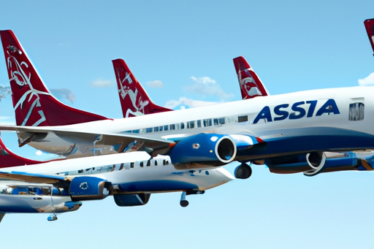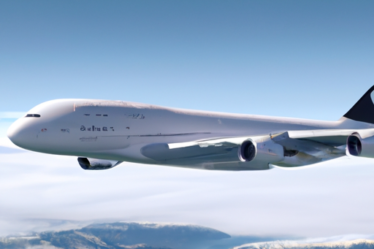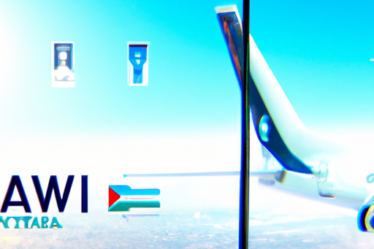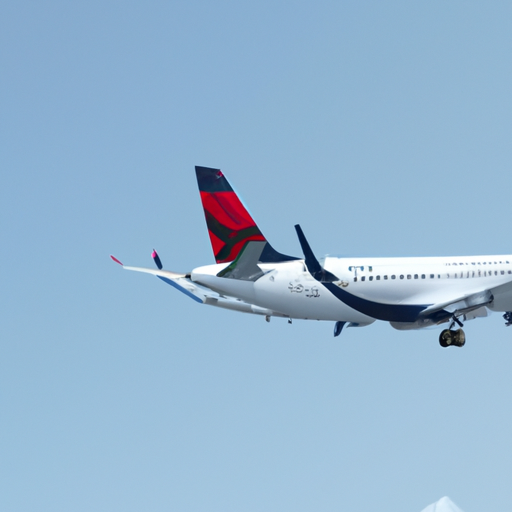
Benefits of Expanding Delta’s Airbus A220 Fleet
Delta Airlines recently announced that it has exercised options for an additional 12 Airbus A220 aircraft, further expanding its fleet of this state-of-the-art aircraft. This decision comes as no surprise, given the numerous benefits that Delta has experienced since introducing the A220 into its operations.
One of the key advantages of expanding Delta’s Airbus A220 fleet is the aircraft’s fuel efficiency. The A220 is designed to be highly fuel-efficient, resulting in significant cost savings for the airline. With rising fuel prices being a constant concern for airlines, the A220’s fuel efficiency is a welcome relief. Not only does this help Delta reduce its operating costs, but it also contributes to a more sustainable and environmentally friendly operation.
In addition to its fuel efficiency, the A220 offers a range of other benefits that make it an attractive choice for Delta. One such benefit is its spacious cabin. Despite being a narrow-body aircraft, the A220 provides passengers with a comfortable and roomy interior. The aircraft’s wider seats and larger windows create a more pleasant flying experience, enhancing customer satisfaction.
Furthermore, the A220 is equipped with the latest technology and amenities, ensuring a modern and enjoyable journey for passengers. The aircraft features state-of-the-art entertainment systems, high-speed Wi-Fi, and USB charging ports at every seat. These amenities, combined with the spacious cabin, contribute to a superior passenger experience, setting Delta apart from its competitors.
Another advantage of expanding Delta’s A220 fleet is the aircraft’s versatility. The A220 is capable of operating on both short-haul and long-haul routes, making it a flexible choice for the airline. This versatility allows Delta to optimize its fleet utilization and adapt to changing market demands. Whether it’s serving popular domestic routes or expanding its international network, the A220 provides Delta with the flexibility to meet its customers’ needs.
Moreover, the A220’s range and performance capabilities enable Delta to explore new markets and open up new routes. With its ability to fly longer distances, the A220 allows the airline to connect previously underserved cities and offer more travel options to its customers. This expansion of Delta’s route network not only benefits passengers but also strengthens the airline’s competitive position in the industry.
Expanding Delta’s A220 fleet also has positive implications for the airline’s workforce. The addition of more A220 aircraft creates job opportunities for pilots, cabin crew, and maintenance personnel. As Delta continues to grow its fleet, it can provide more employment opportunities and contribute to the overall economic development of the communities it serves.
In conclusion, the decision to exercise options for an additional 12 Airbus A220 aircraft is a strategic move by Delta Airlines. The numerous benefits of expanding its A220 fleet, including fuel efficiency, spacious cabin, modern amenities, versatility, and the ability to open up new routes, make the A220 an excellent choice for the airline. Furthermore, this expansion creates job opportunities and contributes to the economic growth of the communities Delta serves. With its commitment to providing a superior passenger experience and staying at the forefront of innovation, Delta continues to solidify its position as a leading airline in the industry.
Exploring Delta’s Investment in Additional Airbus A220 Aircraft
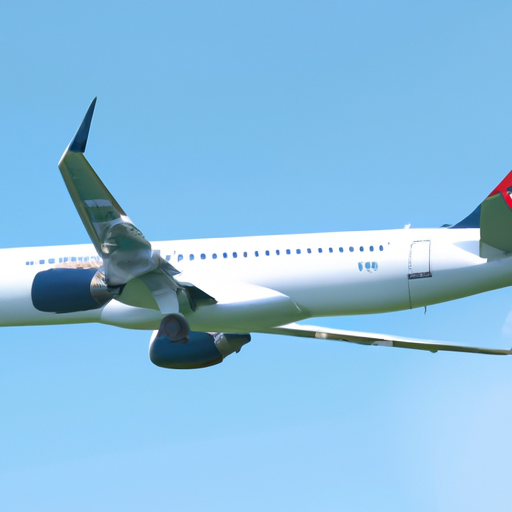
Delta Airlines has recently announced that it is exercising options to purchase an additional 12 Airbus A220 aircraft. This move comes as part of Delta’s ongoing efforts to modernize its fleet and enhance the customer experience. The decision to invest in more A220s is a testament to the airline’s confidence in the aircraft’s performance and its commitment to providing passengers with a superior travel experience.
The Airbus A220, formerly known as the Bombardier CSeries, is a state-of-the-art aircraft that offers a range of benefits for both airlines and passengers. With its advanced aerodynamics and fuel-efficient engines, the A220 delivers significant fuel savings compared to older aircraft models. This not only reduces operating costs for airlines but also helps to minimize the environmental impact of air travel.
In addition to its fuel efficiency, the A220 also offers passengers a more comfortable and enjoyable flying experience. The aircraft features larger windows, spacious overhead bins, and wider seats, providing passengers with more room to relax and enjoy their journey. The A220’s advanced noise reduction technology also ensures a quieter cabin, allowing passengers to rest or work in a peaceful environment.
Delta’s decision to exercise options for additional A220s is a clear indication of the airline’s satisfaction with the aircraft’s performance. Since introducing the A220 into its fleet in 2019, Delta has been impressed with its reliability, efficiency, and passenger appeal. The airline currently operates a fleet of 31 A220s, with plans to add the additional 12 aircraft by 2022.
By investing in more A220s, Delta is not only enhancing its fleet but also expanding its route network. The A220’s versatility allows it to operate on both short-haul and long-haul routes, opening up new possibilities for Delta to connect passengers to more destinations. With its range of approximately 3,400 miles, the A220 can comfortably serve both domestic and international routes, providing passengers with more options and flexibility.
Delta’s investment in the A220 also aligns with the airline’s commitment to sustainability. The aircraft’s fuel efficiency and reduced emissions contribute to Delta’s goal of becoming carbon neutral by 2030. By operating a more environmentally friendly fleet, Delta is taking proactive steps to minimize its impact on the planet and support a more sustainable future for the aviation industry.
In conclusion, Delta’s decision to exercise options for an additional 12 Airbus A220 aircraft is a strategic move that will benefit both the airline and its passengers. The A220’s fuel efficiency, passenger comfort, and versatility make it an ideal choice for Delta as it continues to modernize its fleet and expand its route network. This investment not only demonstrates Delta’s confidence in the A220 but also its commitment to providing passengers with a superior travel experience. With the addition of these new aircraft, Delta is well-positioned to continue delivering on its promise of safe, reliable, and sustainable air travel.
Potential Impacts of Delta’s Decision to Add 12 More Airbus A220s
Delta Airlines recently announced that it has exercised options to add an additional 12 Airbus A220 aircraft to its fleet. This decision has the potential to have a significant impact on both Delta and the aviation industry as a whole.
One potential impact of Delta’s decision is the increased capacity and efficiency that these new aircraft will bring. The Airbus A220 is known for its fuel efficiency and advanced technology, which will allow Delta to operate more flights with less fuel consumption. This not only benefits the airline’s bottom line but also has positive environmental implications, as it reduces carbon emissions.
Furthermore, the addition of these 12 aircraft will enable Delta to expand its route network and offer more flights to its customers. With the A220’s range of approximately 3,400 miles, Delta can explore new markets and connect more cities, providing travelers with more options and convenience. This expansion could also lead to increased competition among airlines, ultimately benefiting consumers with lower fares and improved service.
In addition to the operational advantages, the Airbus A220 offers a superior passenger experience. The aircraft features a spacious cabin with wider seats and larger windows, providing a more comfortable and enjoyable journey for travelers. Delta’s decision to add more A220s demonstrates its commitment to enhancing the customer experience and staying ahead of the competition.
Another potential impact of Delta’s decision is the boost it provides to the aviation industry. The A220 program, formerly known as the Bombardier C Series, faced significant challenges in its early years. However, with Delta as a major customer, the program gained credibility and attracted other airlines’ interest. By exercising options for additional A220s, Delta is not only showing confidence in the aircraft but also supporting the program’s growth and success.
Furthermore, Delta’s decision could have a ripple effect on other airlines’ fleet strategies. As one of the largest airlines in the world, Delta’s choices often influence industry trends. If other airlines see the benefits and success of Delta’s A220 fleet, they may consider adding these aircraft to their own fleets. This could lead to increased orders for Airbus and further establish the A220 as a popular choice among airlines worldwide.
Lastly, Delta’s decision to add more A220s highlights the importance of strategic fleet planning. Airlines constantly evaluate their fleet composition to ensure they have the right aircraft for their needs. By exercising options for additional A220s, Delta is demonstrating its confidence in the aircraft’s performance and its ability to meet the airline’s long-term goals. This decision showcases Delta’s commitment to investing in modern, efficient, and passenger-friendly aircraft.
In conclusion, Delta’s decision to add 12 more Airbus A220 aircraft has the potential to bring numerous benefits to the airline and the aviation industry. From increased capacity and efficiency to an enhanced passenger experience, these aircraft offer a range of advantages. Additionally, Delta’s support for the A220 program and its influence on industry trends further solidify the aircraft’s position in the market. Overall, this decision showcases Delta’s commitment to innovation and customer satisfaction, setting a positive example for the industry as a whole.
